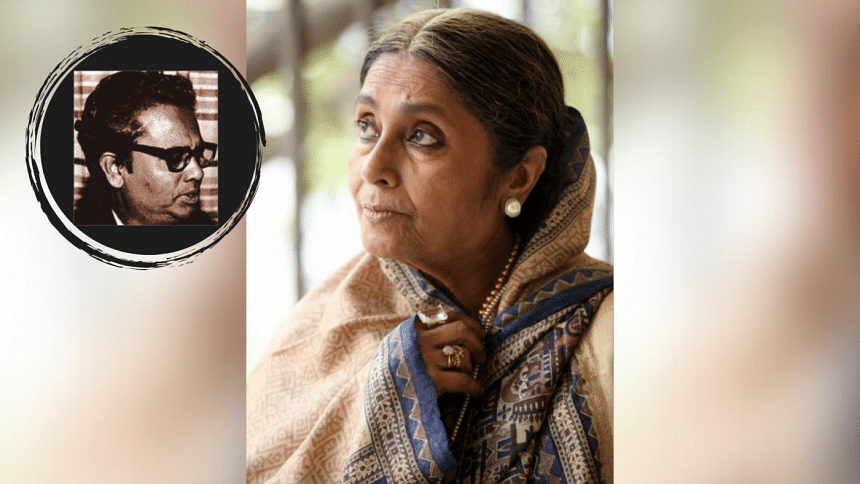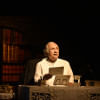My brother Munier Chowdhury inspired my acting journey: Ferdousi Majumdar

Ferdousi Majumdar is one of the most prominent figures in Bangladeshi theatre, television, and film. She has been honoured with both the Independence Award and the Ekushey Padak by the state for her outstanding contributions to the cultural arena.
The artiste has penned an emotional note for her brother Shaheed Munier Chowdhury , who disappeared on December 14, 1971, just two days before the independence of Bangladesh.
Among 14 siblings, Munier Chowdhury—an educationist, playwright, literary critic, and political dissident—was the second. He was only 47 years old at the time of his forced disappearance and murder.
"Munier bhai was the most intelligent and witty among all of us," she wrote in a note published in The Daily Samakal. "The depth of knowledge and education he had accumulated is beyond description. Munier bhai completed his MA in two subjects—first in English and then in Bengali. Remarkably, he completed his MA in Bengali while in prison and, to everyone's surprise, secured the first position in the first class."
"He spoke in a well-structured and excellent manner. His choice and use of words were extraordinary. He loved to speak in a slightly formal bookish style—sometimes quoting Michael, sometimes Rabindranath, and at other times, Bankim."
Ferdousi mentioned that Munier's way of speaking was truly a subject of discussion, "Using beautiful, complex Bengali words was his natural habit. When he spoke in his fluent and candid manner, everyone would listen to him as if spellbound; nothing seemed unusual coming from his mouth."
"Often, we tried to speak like him, but it was in vain—our voices sounded ridiculous to us. To give an example, once, for some reason, my brother was knocking on the door of my room for a long time. It took a little while to open the door. When I finally opened it, he asked, 'Why did it take so long? What were you doing?' I replied in the same refined language as my brother, 'I was partaking in a meal.'"
"He responded, 'What do you mean by partaking? You don't partake, you eat. Kings and emperors partake in meals.' He had this sense of humour, and he would make such remarks spontaneously. Anyone who spoke to him for even 10 minutes would be left awestruck."
She further reminisced when Munier used to teach at the university, even students from other classes would come and stand at the back to listen. "He was a popular teacher. His teaching style was entirely unique. Those who attended his classes used to say that they talked about those classes for the rest of their lives. Even in reading Munier bhai's translations, it never felt like you were reading a translation. It was so simple and fluid."
"We, his siblings, saw him a little differently than the way people perceived Munier bhai. He was very knowledgeable, well-read, and aware of so many things. He would write plays and read them out to us. He loved us dearly. Whatever fruit was in season, he would bring it home. He was so simple and down-to-earth."
Ferdousi remarked, "My father didn't like plays, music, or theatre. In the dialect of Noakhali, he used to say, 'If any of you act in a play, I'll slit their throat.' Acting in a play was out of the question. One day, I was standing by the window, and Munier bhai came to me and said, 'Will you act in one of my plays?' I was astonished and said, 'What are you talking about? Father will slit my throat!' Later, he said, 'I'll take the responsibility for that. You just tell me whether you'll do it.'
"I didn't know how to act or what to do, but he said, 'You don't need to do anything. It's a robot character—an automaton. You don't have to understand anything. Just say your lines. No need for facial expressions or gestures.' Since he took the responsibility, I gained the courage to act. After the performance, Munier bhai was overjoyed. He showered me with affection."
Munier Chowdhury is the one behind the nation receiving such a great actor. He, who encouraged Ferdousi Majumdar to act, unfortunately, couldn't see his sister's success. "That saddens me the most. My last memory of him is from 1971 when we had moved across the border (to India). Many people had advised him to leave as well, but he would say, 'Why should I go? I haven't harmed anyone.' I remember his words very clearly. It was for those very words that he was cruelly murdered. I never even got to see his body."

 For all latest news, follow The Daily Star's Google News channel.
For all latest news, follow The Daily Star's Google News channel. 










Comments